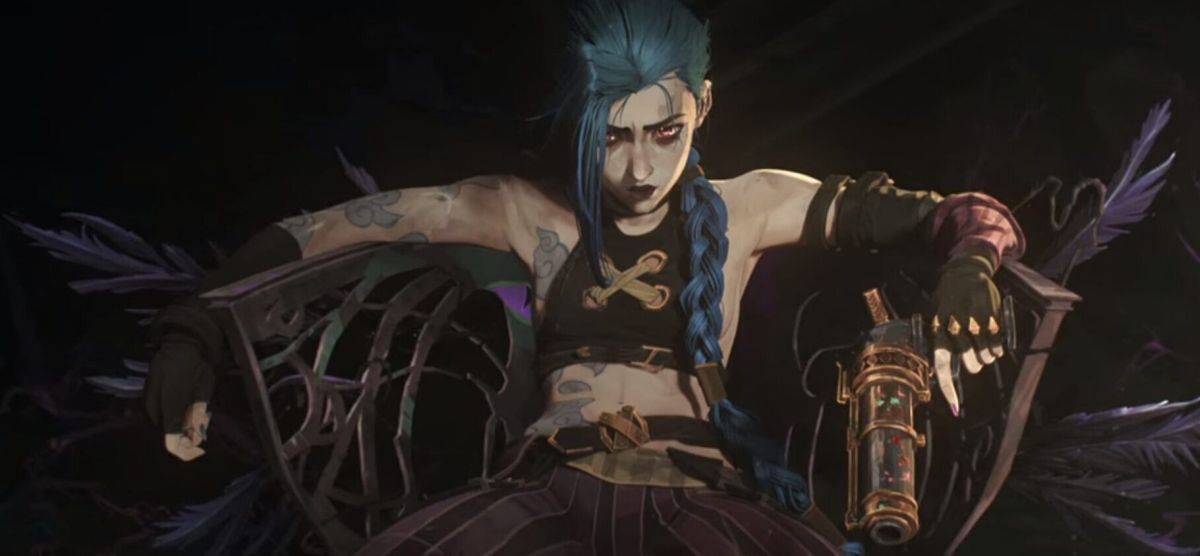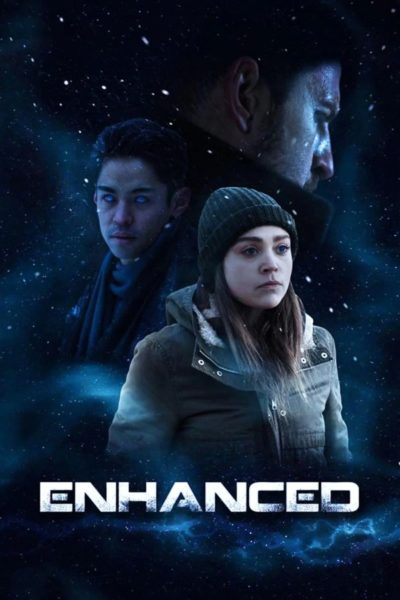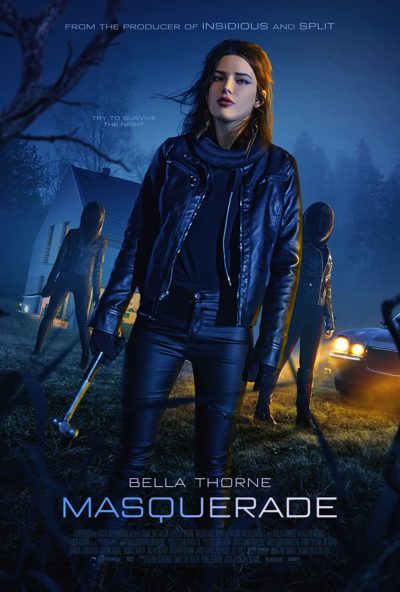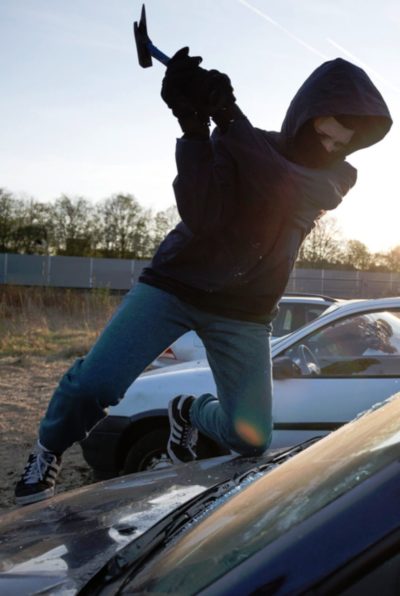★★★½
“Makes a good point”
 Whenever the Olympics are on, we love watching the weird sports that never get covered the rest of the time. That means things like handball, archery and fencing, so I was particularly interested by this Russian film, based around the quest for gold in the women’s sabre event. While it does struggle to move past the usual cliches of sports films, it’s done with enough energy to work. The two protagonists are Aleksandra Pokrovskaya (Khodchenkova), a veteran coming to the end of a long, successful career, and Kira Egorova (Miloslavskaya), a brash teenager who arrives on the scene with a blast, and whose unconventional style causes fits among other fencers. Aleksandra has one final crack at the prize which has eluded her – an Olympic gold – but Kira poses an unprecedented threat to that ambition.
Whenever the Olympics are on, we love watching the weird sports that never get covered the rest of the time. That means things like handball, archery and fencing, so I was particularly interested by this Russian film, based around the quest for gold in the women’s sabre event. While it does struggle to move past the usual cliches of sports films, it’s done with enough energy to work. The two protagonists are Aleksandra Pokrovskaya (Khodchenkova), a veteran coming to the end of a long, successful career, and Kira Egorova (Miloslavskaya), a brash teenager who arrives on the scene with a blast, and whose unconventional style causes fits among other fencers. Aleksandra has one final crack at the prize which has eluded her – an Olympic gold – but Kira poses an unprecedented threat to that ambition.
Yeah, like I said: it’s pretty much Sportsball Movie #4. You know from the start that Aleks and Kira are going to bash heads, but eventually come to a mutual respect for each other’s talents and abilities. Nor is it any surprise when Kira suffers a potentially career-ending injury, and Aleks overcomes her concerns to nurse her back to health [in fairness, she was partly responsible for the incident]. And could the two fencers possibly end up facing each other in the final match at the Olympics? Wild horses could not drag that answer to that question from my lips.
Oh, who am I kidding. Of course they do. But it is to the film’s credit that I genuinely did not know how that was going to turn out. For the makers do a very good job of giving us two well-developed characters. Rather than protagonist/antagonist in the Rocky mould, we get two protagonists, each with their own set of motivations and ambitions. Initially, Kira seems the less likable of the pair, but the more we learn about her background, such as the fraught relationship with her father, the more I came to understand her abrasive personality and don’t give a damn attitude. [Khodchenkova may be familiar, as she has appeared in some Western movies, including The Wolverine and Tinker, Tailor, Soldier, Spy]
It is an issue that fencing at the top level is astonishingly fast. It’s not like cinematic sword fighting, where battles go on for minutes. Here, if your first attack doesn’t hit the mark, you’re likely to find yourself on the receiving, pointy end of your opponent’s weapon. But Bordukov does a good job of capturing the speed, and making it work for the film’s benefit, rather than its detriment. While there may be precious little about the storyline that’s original, it still makes for an engaging couple of hours. If you weren’t a fencing fan before, this might change your mind. So, that’s fencing out of the way, and we already had our Olympic archery movie. and handball film. I just need to find a synchronized swimming movie – and, don’t be fooled, they are hardcore – then I’ll be happy.
Dir: Eduard Bordukov
Star: Svetlana Khodchenkova, Stasya Miloslavskaya, Sergei Puskepalis, Alexey Barabash





 Which brings us to CCW’s Goddess of Gore 2, held at American Legion Post #335 in South Gate, California, on October 3rd, before a crowd of… dozens. Okay, that is a bit snarky. We have worked for and patronize a lot of independent federations locally, and the crowd for them is typically along similar lines, between one and two hundred. That is a bit sad, because given what the participants go through, they deserve more. Then again, tickets for this show started at forty bucks, which is easily twice the price of what we’d pay here in Arizona. Maybe, like petrol, professional wrestling just costs more in California.
Which brings us to CCW’s Goddess of Gore 2, held at American Legion Post #335 in South Gate, California, on October 3rd, before a crowd of… dozens. Okay, that is a bit snarky. We have worked for and patronize a lot of independent federations locally, and the crowd for them is typically along similar lines, between one and two hundred. That is a bit sad, because given what the participants go through, they deserve more. Then again, tickets for this show started at forty bucks, which is easily twice the price of what we’d pay here in Arizona. Maybe, like petrol, professional wrestling just costs more in California.
 I’ve never played League of Legends, but the good news is, you don’t need to, in order to enjoy Arcane. While that may provide some extra depth, it works perfectly well on its own. There is a degree of over-familiarity with the high-level scenario, which is Generic Fantasy Plot #3. Per Wikipedia’s premise, “Amidst the escalating unrest between the advanced, utopian city of Piltover and the squalid, repressed undercity of Zaun…” Yeah, it’s class war time again, cut from the same basic stamp as
I’ve never played League of Legends, but the good news is, you don’t need to, in order to enjoy Arcane. While that may provide some extra depth, it works perfectly well on its own. There is a degree of over-familiarity with the high-level scenario, which is Generic Fantasy Plot #3. Per Wikipedia’s premise, “Amidst the escalating unrest between the advanced, utopian city of Piltover and the squalid, repressed undercity of Zaun…” Yeah, it’s class war time again, cut from the same basic stamp as 


 It’s never a
It’s never a 
 Oh, dear. There’s part of me which thinks this is what you get when you try and make actors out of pool players. For the star here, Barretta, is one of the top women cue artists in the world. She’s joined here by cameos from a couple of bigger pool stars i.e. people even I’ve heard of, in Jeanette ‘The Black Widow’ Lee and Allison Fisher, and you can’t really expect much out of any professional sportswomen, in terms of acting ability. However, she isn’t that bad, though this may just be relative to some of her fellow cast members. And, to be fair to the actors here, you could be an Oscar-winner, and still not be able to do anything with the wretched script, which is little more than a parade of cliches, when not being a shameless advert for the American Poolplayers Association and its leagues.
Oh, dear. There’s part of me which thinks this is what you get when you try and make actors out of pool players. For the star here, Barretta, is one of the top women cue artists in the world. She’s joined here by cameos from a couple of bigger pool stars i.e. people even I’ve heard of, in Jeanette ‘The Black Widow’ Lee and Allison Fisher, and you can’t really expect much out of any professional sportswomen, in terms of acting ability. However, she isn’t that bad, though this may just be relative to some of her fellow cast members. And, to be fair to the actors here, you could be an Oscar-winner, and still not be able to do anything with the wretched script, which is little more than a parade of cliches, when not being a shameless advert for the American Poolplayers Association and its leagues. And, yet… Not only did I finish this, I genuinely enjoyed the whole, lunatic experience. I don’t know if the editing got slightly better as the book went on. Maybe I just became used to the style, which flies defiantly in the face of, not just all literary convention, but the basic rules of English. Bizarrely, by the end, I found myself almost appreciative of the stream of consciousness, neo-Joycean approach. It’s better demonstrated by example, than description, so here’s a sample paragraph – neither particularly good nor bad by the book’s standards:
And, yet… Not only did I finish this, I genuinely enjoyed the whole, lunatic experience. I don’t know if the editing got slightly better as the book went on. Maybe I just became used to the style, which flies defiantly in the face of, not just all literary convention, but the basic rules of English. Bizarrely, by the end, I found myself almost appreciative of the stream of consciousness, neo-Joycean approach. It’s better demonstrated by example, than description, so here’s a sample paragraph – neither particularly good nor bad by the book’s standards: